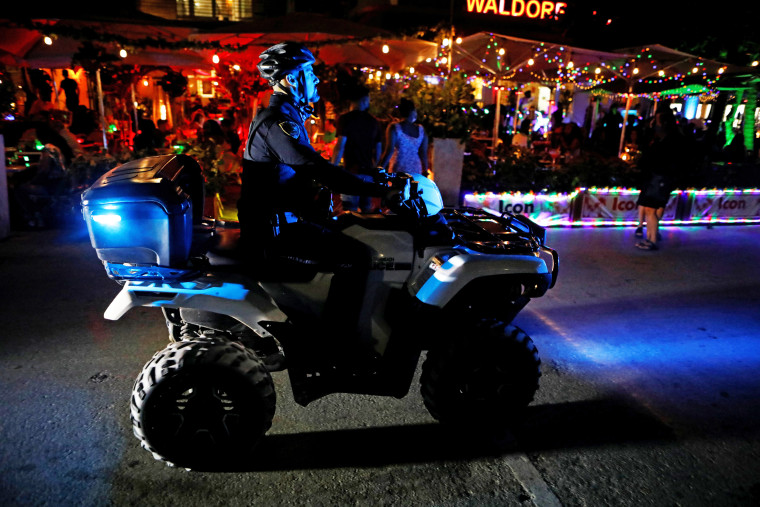Two Miami Beach officers were injured Friday night in an attempt to disperse large spring break crowds, arresting one teenager after he allegedly incited a riot as officers asked him to vacate the area.
Miami Beach Police attempted to break up a group of about 200 or more people who were blocking a roadway, drinking with open containers and smoking what appeared to be marijuana, the department said. James Harrison, 19, was arrested on charges of battery on a police officer, incitement to riot, and disorderly conduct after allegedly failing to leave after officers asked.
Harrison yelled “f--- the police” and told officers “you can suck my d---” after Miami Beach officers arrived to disperse the crowd, according to a police report. He also shoved an officer as a crowd gathered around them, outnumbering the officers, the police report said.
Officers deployed pepper spray and 11 pepper balls to keep back the crowd as they tried to arrest Harrison, who resisted commands, police said. Harrison allegedly grabbed an officer’s police vest when they attempted to turn him around and place handcuffs on him.
The officer and Harrison struggled, eventually falling to the ground, and two other officers had to assist in getting Harrison into handcuffs, the police report said.
Inmate records were not available for Harrison on the Miami-Dade county website Sunday, and public records did not have a phone number to contact him. Court records did not list an attorney for Harrison.
Two officers who were injured Friday night were treated for their injuries and released Saturday morning, but remain off-duty, Miami Beach Police Officer Ernesto Rodriguez said Sunday. Approximately 30 people were arrested Saturday for various charges and large crowds persisted Saturday.

Videos and photos posted to social media websites, including Snapchat’s public Snap Map, showed large, maskless crowds drinking and dancing over the weekend in Miami, as well as large gatherings on beaches.
Public health experts expressed concerns to NBC News last month that spring break might bring another uptick in coronavirus cases if people ignored social distancing recommendations to prevent spreading the virus.
Miami Beach has imposed a midnight curfew, and alcohol on the beach is forbidden, but Florida Gov. Ron DeSantis has not issued statewide mask mandates, capacity limits or similar restrictions despite concerns about spring break spread.
In Miami Beach, tourists are receiving cellphone messages warning, “Vacation Responsibly or Be Arrested.”
“Spring break in Miami Beach may be one of the great rites of passage, but only if you plan on following the rules. Otherwise, you might as well just stay home and save yourself the court costs,” the message reads, followed by reminders of the midnight curfew, that no alcohol can be sold after 10 p.m. and that alcohol, coolers and tents are banned from its beach.
“If you want to party without restrictions, then go somewhere else. Go to Vegas,” Miami Beach City Manager Raul Aguila said during a recent virtual city meeting.
Tourism is the Sunshine State’s No. 1 industry, generating over $91 billion in 2018, and last year spring break was one of the first big casualties of the pandemic as the U.S. went into strict lockdowns. Beaches across Florida were shutting down, but scenes of college students drinking, dancing and getting up close without masks were still shared across social media.
Miami tourism officials say they lost billions of dollars during those three months last year.
DeSantis was criticized last year for failling to issue a statewide mandate to close beaches ahead of anticipated spring break crowds and concerns about the spread of the virus. Cases in Florida surged by late March and early April, with many of the partygoers who were featured in the news expressing regret about their actions.
Brady Sluder went viral last year for telling a local news crew, "If I get corona, I get corona. At the end of the day, I'm not gonna let it stop me from partying.” He later issued a lengthy apology on his Instagram, urging others not to be “arrogant and think you're invincible like myself."
“I would like to sincerely apologize for the insensitive comment I made in regards to COVID-19 while on spring break,” Sluder wrote. "I wasn’t aware of the severity of my actions and comments. I’d like to take this time to own up to the mistakes I’ve made and apologize to the people I’ve offended.”
Last month's Super Bowl in Tampa Bay similarly drew concerns and criticisms for possible superspreader events as crowds gathered for parties in the area.
Officials said that the sporting event itself was not a superspreader, but that an uptick in cases was likely caused by private gatherings — in homes, or unofficial events at bars and restaurants — that revolved around the Super Bowl, according to a Florida Department of Health report.
The statewide positivity rate between Jan. 22 and Feb. 24 was 7.3 percent, but the positivity rate was 7.9 percent in Hillsborough County, where the Super Bowl occurred. The report also noted that the true number of cases specifically tied to the Super Bowl is likely much higher.
The findings were likely hampered by a lack of cooperation in contact tracing efforts, Michael Wiese, chief epidemiologist at the county health department, told the Tampa Bay Times.
"Unfortunately, there are a large percentage of people that don’t want to participate and don’t want to share their personal information with us," Wiese said.
Florida has reported more than 1.9 million coronavirus cases, with 32,828 coronavirus-related deaths as of Sunday morning. About 11 percent of the state's population has been vaccinated, according to NBC News data.